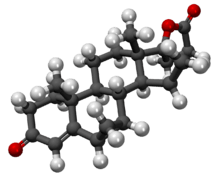Drospirenone
 | |
 | |
| Clinical data | |
|---|---|
| Pregnancy category |
|
| Routes of administration | Oral |
| ATC code |
G03AC10 (WHO) G03AA12 (WHO) G03FA17 (WHO) (combinations with estrogens) |
| Legal status | |
| Legal status |
|
| Pharmacokinetic data | |
| Bioavailability | 76%[1] |
| Protein binding |
95–97% (albumin)[1] (Not to SHBG or CBG)[1] |
| Metabolism | Hepatic (mostly CYP450-independent (reduction/sulfation and cleavage of lactone); minor CYP3A4 contribution (<10%))[1][2][3] |
| Biological half-life | 25–33 hours[1] |
| Excretion | Renal and fecal |
| Identifiers | |
| |
| CAS Number |
67392-87-4 |
| PubChem (CID) | 68873 |
| DrugBank |
DB01395 |
| ChemSpider |
62105 |
| UNII |
N295J34A25 |
| KEGG |
D03917 |
| ChEBI |
CHEBI:50838 |
| ChEMBL |
CHEMBL1509 |
| Chemical and physical data | |
| Formula | C24H30O3 |
| Molar mass | 366.493 g/mol |
| 3D model (Jmol) | Interactive image |
| |
| |
| (verify) | |
Drospirenone (INN, USAN), also known as 1,2-dihydrospirorenone, is a steroidal progestin of the spirolactone group used in birth control pills and postmenopausal hormone replacement therapy pills.[4]
It is sold as a combined oral contraceptive under the brand names Yasmin (US, EU, Latin America), Jasmine (France), Yarina (Russia) [5] in a dosage containing drospirenone 3 mg/ethinylestradiol 30 µg. In the United States, Bayer Schering released a pill based on Yasmin with the B vitamin folate (B9), which is marketed under the names Safyral and Beyaz.
Worldwide it is also sold under the brand names Yaz and Yasminelle in a lower dosage containing drospirenone 3 mg/ethinylestradiol 20 µg.
Medical uses
Drospirenone is an ingredient in some birth control pills and hormone replacement therapy. In combination with ethinyl estradiol it is used as contraception, and for women who want contraception it is also approved by the U.S. Food and Drug Administration (FDA) to treat moderate acne and premenstrual dysphoric disorder.[6]
Adverse effects
Drospirenone is an aldosterone antagonist with potassium-sparing properties, though in most cases no increase of potassium levels is to be expected.[7] In women with mild or moderate renal insufficiency, or in combination with chronic daily use of other potassium-sparing medications (ACE inhibitors, angiotensin II receptor antagonists, potassium-sparing diuretics, heparin, aldosterone antagonists, or NSAIDs), a potassium level should be checked after two weeks of use to test for hyperkalemia.[7][8] In addition to contraindications common to all combined estrogen-progestin medications, drospirenone-containing medications are contraindicated in women with severe renal insufficiency according to European Medicines Agency (EMA)-approved labels,[7] and contraindicated in women with renal insufficiency, adrenal insufficiency, or liver disease according to FDA-approved labels.[9]
Women who take contraceptive pills containing drospirenone have a six- to sevenfold risk of developing thromboembolism (dangerous blood clots) compared to women who do not take any contraceptive pill, and have twice the risk (some epidemiological studies suggest thrice, according to the FDA) compared to women who take a contraceptive pill containing levonorgestrel, though the actual risk is small, in the neighborhood of 9 to 27 out of 10,000 women on an oral contraceptive for a year (up to 9 for levonorgestrel vs up to 27 for drospirenone, or about 0.09% vs 0.3% per year.)[10]
While all oral contraceptives can increase the risk for venous thrombembolic events, including fatal blood clots, several studies have reported a greater risk for women taking contraceptives containing drospirenone. (Before becoming alarmed at the huge "relative" differences in risk, one must remember that the "actual" risks involved are quite small — in the neighborhood of 1 in 10,000 to 27 in 10,000 in a year).[11]
When the U.S. Food and Drug Administration (FDA) became concerned about the risks of drospirenone, they funded studies based on the medical records of more than 800,000 women taking oral contraceptives. They found that the risk of VTE, which includes dangerous and potentially fatal blood clots, was 93% higher for women who had been taking oral contraceptives made with drospirenone for only 3 months or less and 290% higher for women taking drospirenone oral contraceptives for 7–12 months, compared to women taking other types of oral contraceptives. To determine the exact risk for women of different ages and different circumstances, further study is warranted.[12]
The FDA recently updated the label for contraceptives containing drospirenone to include warnings for stopping use prior to and after surgery, and to warn that contraceptives with drospirenone may have a higher risk of dangerous blood clots.[9]
Pharmacology
Pharmacodynamics
Drospirenone binds strongly to the progesterone receptor (PR) and mineralocorticoid receptor (MR), with lower affinity, to the androgen receptor (AR), and very low affinity for the glucocorticoid receptor (GR).[13][14] It is an agonist of the PR and an antagonist of the MR and AR, and hence, a progestogen, antimineralocorticoid, and antiandrogen.[13] Drospirenone is said to be devoid of any estrogenic or glucocorticoid or antiglucocorticoid activity.[13] It has potent antigonadotropic effects at sufficient dosages as a result of PR activation.[13] It has been regarded that drospirenone has a pharmacological profile that is very closely related to that of natural progesterone, due to the combination of both progestogenic and antimineralocorticoid actions.[13]
Drospirenone is 8–10 times more potent as an antimineralocorticoid relative to spironolactone (3 mg drospirenone is equivalent to about 20–25 mg spironolactone in this regard[15]).[13][16] It is more potent as an antiandrogen relative to spironolactone also but is less potent relative to cyproterone acetate, having about one-third the potency of this drug.[13][16] Progestogenic, antimineralocorticoid, and mild antiandrogenic effects have been observed in humans during treatment with drospirenone at a dosage range of 0.5 to 4 mg per day orally.[16]
The antimineralocorticoid properties exhibited by drospirenone promote sodium excretion and prevent water retention.[17]
Pharmacokinetics
Drospirenone is taken orally with about 76% bioavailability. It is bound not by sex hormone-binding globulin or corticosteroid binding globulin, but by other serum proteins. Metabolites have not been shown to be biologically active, show up in urine and feces, and are essentially completely excreted within 10 days.
Chemistry
It is an analog to spironolactone, with a molecular weight of 366.5 and the molecular formula C24H30O3.
Formulations
The compound is part of certain newer oral contraceptive formulations:
- Yasmin/Jamine/Yarina contains 3 mg drospirenone and 30 mcg ethinylestradiol per tablet. It is indicated for the prevention of pregnancy in women who elect an oral contraceptive.
- Safyral contains 3 mg drospirenone and 30 mcg ethinylestradiol per tablet. It is indicated for the prevention of pregnancy in women who elect an oral contraceptive as well as to provide a daily dose of folate supplementation, which is recommended for women in their reproductive years.� Folate lowers the risk of having rare neural tube birth defects in a pregnancy occurring during Safyral use or shortly after stopping.[18]
Litigation
In January 2011 the CBC TV program Marketplace ran a segment discussing issues involved with the usage of Yaz/Yasmin.[19]
In July 2012, Bayer notified its stockholders that there were more than 12,000 lawsuits against the company involving Yaz, Yasmin, and other oral contraceptives with drospirenone, and that the company by then settled 1,977 cases for $402.6 million, for an average of $212,000 per case, while setting aside $610.5 million to settle the others.[20]
See also
References
- 1 2 3 4 5 Krattenmacher, Rolf (2000). "Drospirenone: pharmacology and pharmacokinetics of a unique progestogen". Contraception. 62 (1): 29–38. doi:10.1016/S0010-7824(00)00133-5. ISSN 0010-7824.
- ↑ Bachmann, Gloria (2009). "Drospirenone/ethinyl estradiol 3 mg/20 µg (24/4 day regimen): hormonal contraceptive choices – use of a fourth-generation progestin". Patient Preference and Adherence: 259. doi:10.2147/PPA.S3901. ISSN 1177-889X.
- ↑ Wiesinger, Herbert; Berse, Matthias; Klein, Stefan; Gschwend, Simone; Höchel, Joachim; Zollmann, Frank S.; Schütt, Barbara (2015). "Pharmacokinetic interaction between the CYP3A4 inhibitor ketoconazole and the hormone drospirenone in combination with ethinylestradiol or estradiol". British Journal of Clinical Pharmacology. 80 (6): 1399–1410. doi:10.1111/bcp.12745. ISSN 0306-5251.
- ↑ Buckingham, John, ed. (1994). "Spirorenone, INN S-01057". Dictionary of Natural Products, Volume 5, R–Z, R-00001 – Z-00072. London: Chapman & Hall. p. 5201. ISBN 0-412-46620-1. Retrieved May 28, 2012.
- ↑ http://www.doz.pl/leki/p8625-Daylette
- ↑ Cerner Multum, Inc. (June 11, 2012). "drospirenone and ethinyl estradiol". Auckland, New Zealand: Drugs.com. Retrieved October 24, 2011.
- 1 2 3 Bayer (March 25, 2013). "Summary of Product Characteristics (SPC): Yasmin". London: electronic Medicines Compendium (eMC), Datapharm. Retrieved April 24, 2014.
4.3. Contraindications: • Severe renal insufficiency or acute renal failure. • Presence or history of severe hepatic disease as long as liver function values have not returned to normal.
- ↑ Nelson, Anita L.; Cwiak, Carrie (2011). "Combined oral contraceptives (COCs)". In Hatcher, Robert A.; Trussell, James; Nelson, Anita L.; Cates, Willard Jr.; Kowal, Deborah; Policar, Michael S. (eds.). Contraceptive Technology (20th revised ed.). New York: Ardent Media. pp. 249–341. ISBN 978-1-59708-004-0. ISSN 0091-9721. OCLC 781956734.
- 1 2 Bayer (April 10, 2012). "Yasmin full prescribing information" (PDF). Silver Spring, Md.: Food and Drug Administration (FDA). Retrieved April 14, 2012.
4. Contraindications: • Renal impairment. • Adrenal insufficiency. • Liver disease.
- ↑ Lidegaard, Øjvind; Milsom, Ian; Skovlund, Charlotte Wessel; Skjeldestad, Finn Egil; Løkkegaard, Ellen (October 25, 2011). "Risk of venous thromboembolism from use of oral contraceptives containing different progestogens and oestrogen doses: Danish cohort study, 2001–9" (PDF). BMJ. 343: d6423. doi:10.1136/bmj.d6423. PMC 3202015
 . PMID 22027398. Retrieved November 26, 2011.
. PMID 22027398. Retrieved November 26, 2011. - ↑ Lidegaard, Øjvind; Milsom, Ian; Geirsson, Reynir Tomas; Skjeldestad, Finn Egil (July 2012). "Hormonal contraception and venous thromboembolism" (PDF). Acta Obstetricia et Gynecologica Scandinavica. 91 (7): 769–778. doi:10.1111/j.1600-0412.2012.01444.x. PMID 22568831. Retrieved October 22, 2012.
- ↑ Dunn, Nick (April 21, 2011). "The risk of deep venous thrombosis with oral contraceptives containing drospirenone. Data are inconclusive, but alternatives may be preferable unless specifically contraindicated. (editorial)" (PDF). BMJ. 342: d2519. doi:10.1136/bmj.d2519. PMID 21511807. Retrieved April 25, 2011.
- 1 2 3 4 5 6 7 Muhn P, Fuhrmann U, Fritzemeier KH, Krattenmacher R, Schillinger E (1995). "Drospirenone: a novel progestogen with antimineralocorticoid and antiandrogenic activity". Ann. N. Y. Acad. Sci. 761: 311–35. doi:10.1111/j.1749-6632.1995.tb31386.x. PMID 7625729.
- ↑ Fuhrmann, Ulrike; Krattenmacher, Rolf; Slater, Emily P.; Fritzemeier, Karl-Heinrich (1996). "The novel progestin drospirenone and its natural counterpart progesterone: Biochemical profile and antiandrogenic potential". Contraception. 54 (4): 243–251. doi:10.1016/S0010-7824(96)00195-3. ISSN 0010-7824.
- ↑ Hermann P.G. Schneider; Frederick Naftolin (22 September 2004). Climacteric Medicine - Where Do We Go?: Proceedings of the 4th Workshop of the International Menopause Society. CRC Press. pp. 133–. ISBN 978-0-203-02496-6.
- 1 2 3 Elger W, Beier S, Pollow K, Garfield R, Shi SQ, Hillisch A (2003). "Conception and pharmacodynamic profile of drospirenone". Steroids. 68 (10-13): 891–905. doi:10.1016/j.steroids.2003.08.008. PMID 14667981.
- ↑ Genazzani, Andrea R.; Mannella, Paolo; Simoncini, Tommaso (February 2007). "Drospirenone and its antialdosterone properties". Climateric. 10 (Supplement 1): 11–18. doi:10.1080/13697130601114891. PMID 17364593. Retrieved November 26, 2011.
- ↑ "Yasmin/Safyral". Retrieved February 9, 2015.
- ↑ Johnson, Erica (January 20, 2011). "Video: Marketplace looks into alleged Yasmin risks". Marketplace (TV series). Vancouver, B.C.: CBC News. Retrieved October 13, 2011.
- ↑ Feeley, Jef; Kresge, Naomi (July 31, 2012). "Bayer's Yasmin lawsuit settlements rise to $402.6 million". Bloomberg News. New York. Retrieved November 11, 2012.
Further reading
- Krattenmacher, Rolf (July 2000). "Drospirenone: pharmacology and pharmacokinetics of a unique progestogen". Contraception. 62 (1): 29–38. doi:10.1016/S0010-7824(00)00133-5. PMID 11024226.